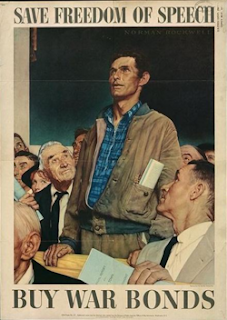 Kevin Jon Heller cuts right to the heart of what will happen now that the EU Criminalizes Racist and Xenophobic Speech:
Kevin Jon Heller cuts right to the heart of what will happen now that the EU Criminalizes Racist and Xenophobic Speech:
The real problem with the Framework’s approach to racist and xenophobic speech is the profoundly chilling effect it will almost certainly have on such speakers. What rational artist or filmmaker will risk pushing the ideological envelope if she knows that the criminality of her speech depends not on her intent but on the (unpredictable) reactions of others to it?
In the end, those who support a robust right of freedom of expression have only this to console them: it could have been worse. The current Framework criminalizes far less speech than many EU Member States and European NGOs had hoped. The original 2001 proposal considered by the EU Council went much further …
The 2001 proposals are also here [hat tip: Ludo Block] and here (pdfs). I’ve already expressed my regret on this blog, here and here, at the most recent iteration (pdf; via Tim Worstall); now Eugene Volokh advises: Careful Doing History in Europe — You Might Go to Prison:
So if you’re writing about whites’ relations with American Indians’, or the Crusades, or the reconquest of Spain from the Moors, or for that matter about any aspect of history that involves ethnic-based slaughter — think how much of that there has been in history — you might be violating the law. True, this would be covered only if your actions are “carried out in a manner likely to incite to violence or hatred against such a group or a member of such a group.” Is that really great comfort, though? If a tribunal concludes that your actions were likely to incite hatred against the defeated group, or even a member of the group, you’re a criminal.
This seems fanciful, except that as Eugene shows here (France, Historians, and Free Speech) and here (Historians Getting Into Legal Trouble), it has already happened, in France. Indeed, as argued in a tremendous post – EU Phobia: more Crimes against the Ideology! – on Phanari:
What the EU is in the process of doing, is making our societies less free, so as to accommodate intolerant minorities. By adopting their standards, we are getting it backwards.
Not Sassure weighs in with the view that EU proposal on racism and xenophobia [are] worrying but not for the obvious reasons. He seems sanguine enough about the proposal in principle, in part because he thinks that it won’t require changes to current English law, but he nevertheless concludes that it is “profoundly objectionable” because
it extends EU competence into something that’s clearly a matter of domestic criminal law. Obviously we need laws against theft and assault, but it’s no business of the EU to tell us that we should have them or how they should be defined and what the minimum penalties should be, and I can see no difference in principle between that than letting the EU tell us we must have laws against incitement to racial hatred, desirable though such laws may well be.
As Siberian Light and Devil’s Kitchen [in a quite superb roundup of the blogosphere’s reaction to the proposal] both point out, this is not merely academic:
This legislation specifically covers bloggers[,] and where your site is hosted is of absolutely no consequence …
As the title to this post says: Xenophobic European Bloggers Beware!
Thanks for the link. I have to say that I don’t quite understand the objections to bloggers being subject to the laws of the country where they’re writing rather than those of the country where their site happens to be hosted. On the contrary, it seems far preferable to running the risk of being extradited from London or Dublin to answer charges that you’ve allegedly committed an offence under (e.g.) American federal or state law.
That’s the main objection to the present US-UK extradition treaty; it made it far too easy to send the NatWest Three to face charges in Texas for frauds which, if they were committed, were committed in the UK against a British company.
Even as I was writing the above, Ratio Juris was writing about Holocaust Denial, the First Amendment, & “Over-Protecting” Speech, concering an off-Broadway play entitled “Denial,” which explores the relationship between the right of free of speech and Holocaust denial.